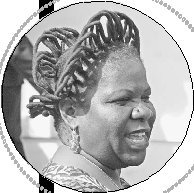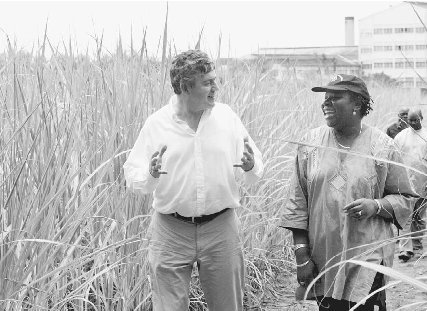Luisa Diogo Biography

April 11, 1958 • Tete province, Mozambique
Prime Minister of Mozambique
Located in southeastern Africa, the tiny country of Mozambique is one of the poorest in the world, with approximately 70 percent of the population living below the poverty line. It is also a country frequently devastated by drought and floods, and in the early 2000s it was still recovering from a civil war that rocked the nation for nearly seventeen years (1975–92). Despite its problems, however, Mozambique is fortunate to have a visionary leader at its helm: Prime Minister Luisa Diogo. Diogo served as Mozambique's minister of finance for five years, from 1999 until 2004, and during her tenure the country experienced a slow but steady recovery. In February 2004, she was appointed prime minister, becoming the first woman ever to hold the post. Diogo has earned a reputation as a progressive reformer, a passionate advocate, and a savvy business-woman. According to Time, which ranked Diogo as one of the top leaders and revolutionaries in the world, she "leads a government that was once written off as a failed state but that now posts economic-growth rates of an Asian tiger."
A rocky history
Luisa Dias Diogo was born on April 11, 1958, in the western Mozambique province of Tete. She attended Dona Maria Primary School in Tete City until she was twelve years old and the Tete Commercial School until she was fourteen. Diogo's high school years were spent at Maputo Commercial Institute. Following high school Diogo went on to study economics at Maputo's Eduardo Mondlane University. After graduating with a bachelor's degree in 1983, she continued her studies at the University of London, where she earned a master's degree in financial economics in 1992.
In 1980, while still in college, Diogo began working in Mozambique's Finance Ministry. It was a rocky time in the country's history; Mozambique was embroiled in political and military upheaval. In 1975, the nation won its independence from Portugal and became the People's Republic of Mozambique. Peace, however, was short-lived. A civil war erupted between two Mozambique factions: the Mozambique Liberation Front (FREMILO), a coalition of anti-Portuguese, Communist-backed, liberation groups that helped the country win its freedom from colonial Portuguese rule; and the Mozambique National Resistance (RENAMO), an anti-Communist political organization. (Communists believe in a system of government in which the state plans and controls the economy and a single party holds power.) Hostilities between the groups lasted for the next seventeen years, resulting in the deaths of millions.
When Diogo joined the Finance Ministry the country was in year five of its civil war. The FREMILO party was in power, having established a one-party, socialist government, but it faced constant opposition from members of RENAMO. Guerrilla
" Working and struggling are things that do not scare us."
units (small bands of fighters that make surprise attacks) burned bridges, cut power lines, and blocked roadways. This resulted in food and medical shortages and increased unemployment and poverty. The economy of Mozambique was basically in shambles, and the government needed an infusion of new blood. Twenty-two-year-old Diogo proved to be just the answer, and she quickly rose through the ranks of the ministry, becoming a department head in 1986; in 1989 she was named national budget director.
Road to recovery
Diogo remained in the position of director for four years, but after she earned her master's degree she went to work for the World Bank, serving as program officer in Mozambique. The World Bank is an international organization composed of member nations whose primary goal is to assist developing countries. After the 1994 Mozambique elections, President Joaquim Chissano (1939–) invited Diogo to leave the World Bank and join the FREMILO government as deputy finance minister. This marked the economist's entry into the upper level of the Mozambique federal government. Diogo was just thirty-six years old.
As deputy finance minister, Diogo was a key player in drafting and rolling out the government's first five-year development plan. Because the country was still reeling from civil war, the main focus of the plan was on cementing peace within Mozambique's borders. By 1999, the second five-year development plan had room to focus on economic reform. That same year Diogo was promoted to minister of finance and she immediately tackled Mozambique's biggest problems: poverty and economic growth. The answer was financial aid. Because of her growing reputation as an able negotiator, Diogo was able to secure numerous grants from international finance institutions, including the World Bank and the International Monetary Fund. By the early 2000s financial aid accounted for nearly 60 percent of Mozambique's government revenues. In addition, according to the January 1, 2004, issue of The Banker, by 2004 $7 billion in direct foreign assistance had poured into the country.
In 2004 alone Diogo was able to secure $790 million in aid from the World Bank. Such an infusion of funds helped finance much-needed initiatives, including advances in telecommunications, increased agriculture production, and HIV/AIDS (viruses that attack a person's immune system) programs. Although most of the nation's citizens remained poor, Mozambique's economy was starting to revive slowly but steadily. Analysts primarily chalked up the success to Diogo. In the same January 2004 issue of The Banker, she was named Finance Minister of the Year for Africa. According to the article, "It is possibly an overstatement to say that all reform roads lead back to Ms. Diogo, but only just."
Madam prime minister
In February 2004 the Prime Minister of Mozambique, Pascoal Mocumbi (1941–), resigned his post to take a senior position with the World Health Organization (WHO). WHO is an international health agency of the United Nations based in Geneva, Switzerland. (The United Nations was founded in 1945 and is an international organization composed of most of the countries in the world.) It came as no real surprise when President Chisanno tapped Diogo to be Mocumbi's replacement; she would also retain the position of finance minister until the December 2004 elections. According to the constitution of Mozambique, the president is the head of the government; the presidency is an elected position with elections taking place every five years. The president is responsible for appointing the prime minister, who assists him or her in leading the nation.
According to Bonifacio Antonio, in a Regional Economic Development and Integration report, Diogo's "appointment [was] viewed as passing the baton from the generation that fought for independence to the one that has been trained since independence." Mocumbi was sixty-three when he left the prime minister post, which meant he was entrenched in Mozambique's fight for freedom. Diogo was just seventeen years old in 1975, and as part of a new generation of leaders she was more forward-thinking and more willing to take risks.

One of Diogo's first moves was to address the problem of AIDS, a disease that had ravaged the country for more than two decades. In 2004, an estimated 1.4 million of Mozambique's 18 million citizens were infected with HIV, the virus that causes AIDS; approximately 500 people contract the virus every day. In July 2004, Diogo officially launched an AIDS Emergency Programme. The goals of the program included educating citizens about AIDS prevention, providing income for people infected with HIV and their families, and giving assistance and home care to people living with AIDS and for children who have been orphaned by the disease. The program came with a hefty price tag: $8.6 million. But the ever-resourceful Diogo assured the nation that funds were already forthcoming from the World Bank and the Common Fund against AIDS. In a press conference reported on the Africa News Service, Diogo declared, "Despite all the measures so far taken to control the epidemic, the disease continues to spread. We can never accept the situation that is now happening in Mozambique."
Diogo spent the majority of 2004 fine-tuning the govern-ment's next five-year development plan. She was committed to expanding health and education services, promising to annually recruit six thousand new teachers, eight thousand literacy workers, and almost two thousand health workers. In addition, Diogo proposed reforms in several areas, including an overhaul of the judicial system, which had been plagued by accusations of corruption during the Chissano years (1986–2004). There was also a need for a revamped police force; open sales of drugs were prevalent in many Mozambique military neighborhoods. Above all, however, as Diogo explained in a press conference reported in the Africa News Service on March 15, 2005, "Our central objective remains the same. It is the combat against absolute poverty."
A new era
Following the December 2004 elections, President Chissano was replaced by FREMILO candidate Armando Guebuza (1943–), who ushered in a new era in Mozambique politics. Diogo remained in her post of prime minister, but she was relieved of her minister of finance duties so she could concentrate on more extensive government leadership. Her participation in international affairs was also growing because, according to Time, "Her achievements were increasingly attracting global attention." In October 2004 she was personally invited to attend an annual meeting of general directors of the United Nations. Diogo was the sole prime minister chosen to represent all of the world's developing countries.
The tireless leader of Mozambique is also a wife and mother of three. She is married to Albano Silva, one of the country's leading attorneys. Her duties, however, keep her constantly on the go as she fights to resurrect the nation to which has devoted most of her life. One of her primary goals is to make Mozambique, and all developing countries, self-sufficient. Part of the 2004 five-year plan, which was approved in April 2005, included funding for technical and professional education. As Diogo stressed in the January 1, 2004, issue of The Banker, "Developing countries must deepen their knowledge and innovate, design, implement, assess, adjust and exercise ownership over their poverty reduction policies, plans, programmes and projects. Only if they do this serious work will they be able to formulate feasible strategies that have a chance of being successfully implemented."
The people of Mozambique will hold their prime minister accountable for the promises she has made. Diogo established what she calls a "poverty observatory," a forum composed of citizens and members of the media who periodically assess government strategies. "The media often detects government failings more quickly than government does," the prime minister admitted to The Banker in 2004. She went on to add, "Democracy in Mozambique is irreversible. People are increasingly accustomed to government delivering."
For More Information
Periodicals
Brown, Mark Malloch. "Luisa Diogo: Advocate for Africa." Time (April 26, 2004): p. 60.
Eedes, James. "Middle East … Africa: Mozambique—Ready for Stage Two Reforms." The Banker (July 1, 2004).
"Finance Ministers of the Year." The Banker (January 1, 2004).
"Government Determined to Speed Things Up: Diogo." Africa News Service (March 15, 2005).
"HIV/AIDS: We Are All Vulnerable." Africa News Service (July 12, 2004).
Web Sites
Antonio, Bonifacio. "Mozambique: Luisa Diogo, New Prime Minister." REDI News Features. http://www.sardc.net/Editorial/Newsfeature/04110204.htm (accessed on August 23, 2005).
"First Female Prime Minister in Mozambique." afrol News (February 17, 2004). http://www.afrol.com/articles/11288 (accessed on August 23, 2005).
Comment about this article, ask questions, or add new information about this topic: